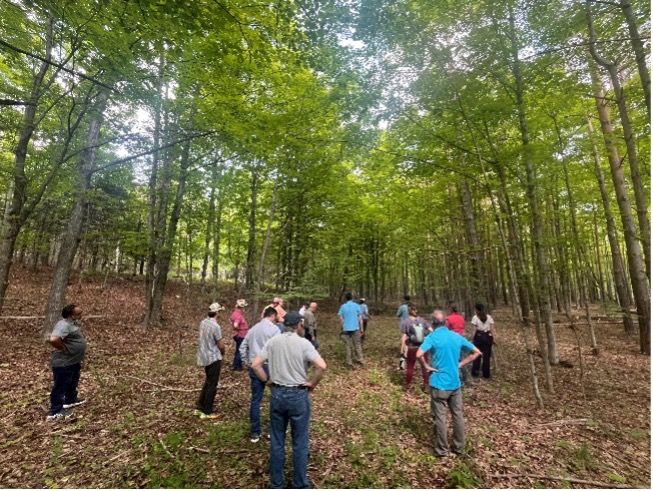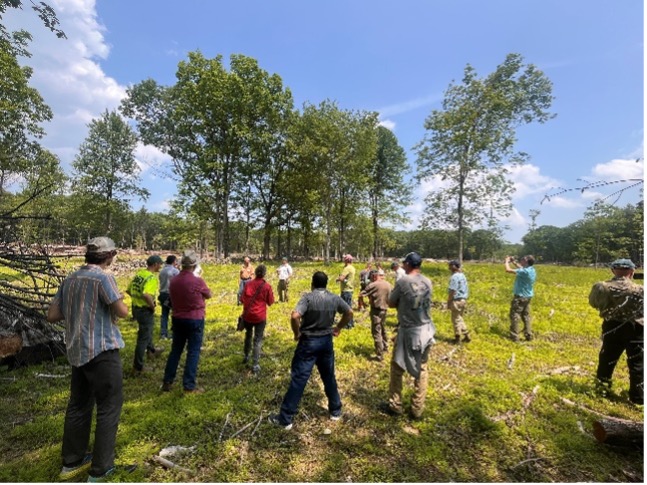FCCP organizes workshop to help landowners engage with the carbon economy in Albany, New York
FCCP organized a 1-day workshop in Albany, New York, to increase landowner and forestry professional engagement with voluntary carbon markets and provide information on other innovative sources of income.

Albany, NY – Dr. Chad Papa, FCCP director, Dr. Raju Pokharel, MSU Department of Forestry, and Evan Beresford, FCCP Program Associate, organized a 1-day workshop that sought to increase landowner and forestry professional decision-making support to engage in voluntary forest carbon markets. 
The workshop consisted of two parts: first, indoor presentations of locally relevant resources, and second, a field visit to a local site enrolled in a voluntary forest carbon program. To kick off the day, Fiona Watt, the NYSDEC Lands & Forests Director and New York State Forester, provided important context and information about how the State of New York approaches forest management and stewardship. Dr. Papa and Dr. Pokharel then presented on the basics of forest carbon management and voluntary forest carbon markets. Participants had the opportunity to learn and access an online forest carbon calculator tool designed to help inform decision-making by conducting a cost-benefit analysis between managing for timber or carbon.
After the tool demonstration, participants learned from Will McCall of Cornell Cooperative Extension about opportunities and resources for landowners in the state. Participants also learned from Jessica Bakowski from Forest Carbon Works(FCW) about opportunities for landowners to engage in carbon markets while still being able to manage for timber products. Lastly, Chris Zimmerman from the Nature Conservancy spoke about both the Family Forest Carbon Program and the TNC Working Woodlands, both of which can help landowners earn income from carbon credits.
 Following lunch, we visited the Albany Water Board’s Alcove Reservoir which includes over 7,000 acres of mixed hardwood enrolled in a voluntary carbon market program. Participants were able to visit a recent red pine harvest and observe how innovative techniques such as slash walls and other natural regeneration tactics are being used to steward this forest to continue to provide clean drinking water for the city of Albany. The group then ventured to the Siuslaw Model Forest managed by Cornall Cooperative Extension to learn about innovative ways to increase income through combining carbon management with fruit and forage crops such as ginseng.
Following lunch, we visited the Albany Water Board’s Alcove Reservoir which includes over 7,000 acres of mixed hardwood enrolled in a voluntary carbon market program. Participants were able to visit a recent red pine harvest and observe how innovative techniques such as slash walls and other natural regeneration tactics are being used to steward this forest to continue to provide clean drinking water for the city of Albany. The group then ventured to the Siuslaw Model Forest managed by Cornall Cooperative Extension to learn about innovative ways to increase income through combining carbon management with fruit and forage crops such as ginseng.
This workshop is a part of the larger “Building forest carbon market decision support” project that is funded in part by a U.S. Department of Agriculture National Institute of Food and Agriculture Renewable Resources Extension Act Capacity Grant in collaboration with the USDA Forest Service, the Wisconsin Department of Natural Resources, the Michigan Department of Natural Resources, Michigan State University Cooperative Extension and the Forest Owner Carbon and Climate Education (FOCCE) program at Penn State University.



 Print
Print Email
Email